
Dental Implants Aurora
Restore the Full Potential of Your Smile

Dental implants have been replacing missing teeth for decades at this point, and they’ve only gotten better over time. In fact, dental implants in Aurora, CO deliver a more lifelike tooth replacement that is able to look, feel, and function exactly like the genuine article. No matter how many teeth you’ve lost, our team at Mauck & Ricci, DDS can use dental implants to help you restore the full potential of your smile again. Contact us today to learn more!
Why Choose Mauck & Ricci, DDS for Dental Implants?
- Partnered with the Best Oral Surgeons in the Aurora Area
- FREE Dental Implant Consultation
- Calm, Welcoming Dental Office Environment
What Are Dental Implants?

Dental implants are small titanium posts – shaped sort of like little screws -- that are inserted directly into the jawbone to support a crown, bridge, or denture. A crown is used to replace a single missing tooth, while bridges and dentures replace multiple or a whole row of lost teeth. With prosthetic roots, your jawbone has the stimulation it needs to stay healthy and whole, and your new teeth have the security to stand firmly in the gums. Dental implants restore your ability to eat, speak, and smile without the stress or worry of missing teeth or an ill-fitting denture.
The Dental Implant Process

Dental implants require multiple steps to receive. While this may be the case, our dentists and team members are happy to discuss the entire process with you from start-to-finish so you know exactly what to expect ahead of time. You’re encouraged to review the steps in more detail below as well as come to our office with questions ready if you have them!
Initial Dental Implant Consultation
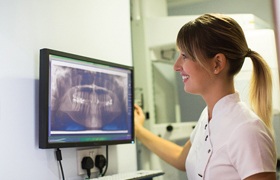
Before beginning your dental implant-supported tooth replacement plan, we will review your oral and overall health history, current medications, and past surgical experiences carefully in order to ensure the greatest chances for successful implantation. We may also need to perform one or more preparatory treatments, including:
- Services to renew oral health for those suffering from chronic conditions like gum disease.
- The extraction of one or more damaged or decayed teeth.
- The placement of a bone or tissue graft may be necessary to improve the amount of supportive tissue available to retain the dental implants.
Once it’s been determined that you are an ideal candidate for dental implants, your dentist in Aurora will refer you to a trusted, local oral surgeon to perform the initial implantation.
Dental Implant Surgery
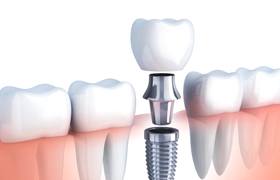
Following your preparatory treatments, our trusted oral surgeon will place your dental implant posts. This procedure is not as invasive as it may sound. First, a small incision is made inside of the gum tissue. Then, the implant posts are positioned directly into the jawbone. Once in place, a protective cap is placed, which allows the implant site to heal while maintaining the shape of the gum tissue in order to attach the replacement teeth.
Dental Implant Osseointegration & Abutment
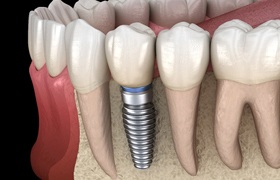
Once the implant posts are in place, they will need to fuse with the underlying bone and gum tissues over the course of several months. This process is called osseointegration, and it is the key to recreating the lost tooth structures and restoring your smile.
The recovery portion of dental implants is vital to the success of your new teeth. It’s a process that takes anywhere from four to eight months to complete, depending on the location of the missing teeth and the health of the jawbone upon implantation. During this time, the bone and implant will gradually fuse together to form one solid unit.
After the implants have fully fused with the jawbone, we’ll attach abutments. These pieces are used to connect the implants to the replacement tooth or teeth. Once the abutments are in place, we design your final restoration based on captured impressions. These will be used by our lab to craft your dental crown, fixed bridge, or denture.
Delivery of Dental Implant Restoration(s)
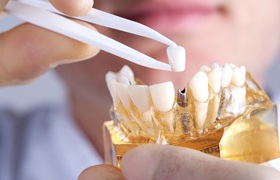
After we receive your final dental restoration from our skilled lab, you’ll return to our office where we’ll affix the crown, bridge, or denture to your implant posts. Once in place, the implant-supported prosthetic will look, feel, and function just like your healthy, natural smile.
Benefits of Dental Implants

When it comes to ways to replace missing teeth in Aurora, dental implants are truly in a class of their own. Thanks to the near-magical process of osseointegration, they offer unmatched stability that other methods, like bridges and dentures alone, simply can’t provide. Whether you want to expand your diet or smile with confidence knowing your teeth will stay in place and keep up with your busy lifestyle, there are many benefits to expect. Consider reviewing a handful of the most notable positives below of choosing dental implants to replace teeth!
Day-to-Day Benefits

- Dramatically Expand Your Diet: Dental implants allow you to comfortably eat a variety of healthy and crunchy foods, including vegetables, fruits, nuts, and even tough and chewy options like steak, pork, and chicken. No longer do you need to prepare your food to be eaten properly for a dedicated denture.
- Improve Your Overall Appearance: Fill in the gaps in your grin so you can smile knowing you look your absolute best. Traditional bridges and dentures can still be noticeable because of how they affect the other aspects of your appearance, such as your cheeks. For example, dental implants prevent hollowing of the cheeks and sagging facial skin.
- Oral Care is Much Easier: You won’t need to remove your dental implants just to clean them. Simply brush and floss your teeth as normal to remove food debris and plaque from your implant crown and the space underneath it.
Health Benefits

- Prevent Future Tooth Loss: The moment a tooth is lost, remaining teeth are at risk of falling out due to diminishing bone tissue inside the jaw. By replacing a tooth with a dental implant sooner rather than later, you keep the jawbone regularly stimulated and prevent atrophy.
- Maintain Better Nutrition: When your diet is limited, getting the proper amount of vitamins and minerals a day becomes increasingly difficult. That isn’t the case with dental implants since you can eat all the foods you enjoy most and get the nutrients you need from them along the way.
- Stop Teeth from Shifting: It’s normal for teeth to shift into the open gaps left behind following tooth loss. However, this can cause your bite to become uneven. Replacing teeth stops this process in its tracks, preventing gaps and changes to your bite’s alignment.
Long-Term Benefits

- Long-Lasting Replacement Teeth: Your dental implant can last for decades, possibly the rest of your life, with proper maintenance. On average, you can expect them to stay healthy for at least 30 years. However, it’s not uncommon for them to last a lifetime for many patients.
- Beautiful Esthetics: Being virtually indistinguishable from your natural teeth, dental implants utilize restorations that are color-matched to look as lifelike as possible. That means only you and our office will know you had them placed.
- High Success Rate: Dental implant treatment is known for being very successful when performed by an expert. In fact, success rates fall between 95% and 98% on average thanks to comprehensive planning, advanced dental technology, and the clinical expertise from the oral surgeons our office partners with.
Who Dental Implants Can Help

To determine whether or not dental implants are a good option for you and your smile, your implant dentist in Aurora will consider two things:
- The state of your jawbone – Successful dental implants require plenty of existing jawbone structure for anchoring. Without it, osseointegration may not occur, leading to implant failure. Bone grafting may be an option for patients who do not have enough supporting bone tissue.
- Your overall health – Patients should be able to undergo surgery in order to be considered for dental implants. This factor may preclude those suffering from uncontrolled diabetes, HIV/AIDS, and advanced cancers. Non-implant supported tooth replacements should be considered for these patients.
As long as you meet these conditions, there is a way for dental implants to complete your smile no matter how many teeth you’re missing!
Missing One Tooth

If you only have one gap in your grin, the space can be filled with a single implant and topped with an incredibly lifelike dental crown. No one except our dentists will be able to tell it’s not one of your natural teeth!
Missing Multiple Teeth

For a few missing teeth in a row, an implant can be placed at either end of the space in your smile. Crowns are then placed on top of those implants, with as many crowns attached as needed to fill the gap. This is known as a dental bridge.
Missing All Teeth
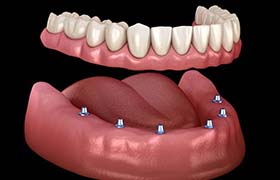
If you’re missing all your teeth on an arch, don’t worry. Your oral surgeon can place an average of four to six dental implants strategically throughout your jawbone to provide enough support for an implant denture. Unlike traditional dentures, this prosthesis won’t lose its fit every few years, and can be either fixed or removable, depending on your preference.
<Link to Implant Dentures page>
All-on-4
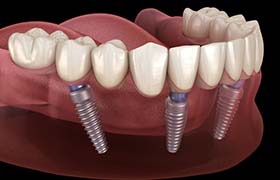
As an alternative to implant dentures, you can rebuild your smile with All-On-4. Only four implant posts are needed to secure your denture to your jawbone. Although fewer posts are used, rest assured you will have a stable foundation for your new smile while also enjoying other advantages, like eliminating the need for bone grafting. Overall, you can chew your favorite foods and smile confidently knowing your denture will stay firmly in place.
Understanding the Cost of Dental Implants
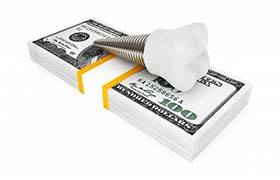
Because no two mouths are alike, neither are the costs of any two dental implant procedures. Your final costs could be dependent on a few factors, such as:
- The current density of your jawbone
- Whether any preliminary procedures are needed
- How many implants you’re receiving
- What kind of restoration you’re receiving
- Whether you choose to undergo sedation during your procedure
Keep in mind that although dental implants might seem expensive up front, they’re actually the most cost-effective tooth replacement in the long run because of their longevity. While bridges and dentures don’t cost that much initially compared to implants, you have to get them adjusted or replaced every few years, which can quickly rack up costs over the years. As long as you take proper care of them, dental implants can last for the rest of your life, without the need for replacement.
Cost of Dental Implant Placement

The bulk of the cost of dental implants is the price of the implant itself and the surgical placement. For a single dental implant and placement, patients typically pay between $1500 and $2000, but very complicated procedures may be higher. For each additional dental implant and placement on the same day, the cost decreases.
Preparatory Costs
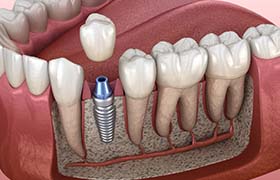
In addition to the cost of the dental implants and their surgical placement, you should also consider the costs of preparatory procedures like tooth extractions and bone and soft tissue grafts. The price for these preparatory procedures varies widely. In many cases, dental insurance will cover part of the cost of these procedures.
Dental Implant Restoration Costs
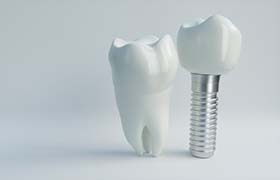
Finally, the cost of your replacement tooth or teeth should be considered. Depending on the number of teeth you’re replacing, the cost will vary. Dental crowns can cost anywhere from $500 and $1500 each, bridges typically run $3000 to $4000, and partial and full dentures can cost between $2500 and $5000 or higher. Dental insurance will typically cover a large part of the cost of the replacement tooth or teeth.
Dental Insurance

For the most part, dental insurance does not cover the cost of dental implants, but other portions of the treatment, like tooth extractions and dental restorations, will usually receive coverage by your insurance provider. We will work with you to understand your dental benefit plans and help you receive the maximum dental insurance coverage.
Advanced Dental Implant Procedures

For dental implants to be successful, they need to have enough healthy jawbone around them to provide a strong foundation. Since the jawbone begins to deteriorate after the natural teeth have been removed, patients who lost their teeth years ago are often left with a jawbone that’s too thin or weak to support implants. In these cases, we may recommend a preliminary procedure such as a sinus lift or bone graft to make sure implants are successful.
Bone Grafting
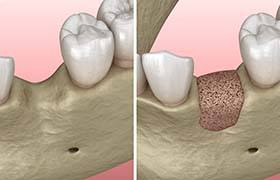
Most people take the strength and stability of their natural teeth for granted and don’t realize that it’s actually their jawbone that accounts for it. Since implants mimic the roots of natural teeth, they also need to be surrounded and supported by adequate bone to be stable and secure.
When jawbone mass and density have been lost, a bone graft may be needed to correct the issue before having implants placed. The procedure is done by adding bone granules into the jaw to strengthen the area where your natural tooth once was. It can be done using bone from another area of your body, but it’s usually done with bone from another source. When the bone granules have been placed, your body will begin growing its own new bone tissue over time, eventually restoring the jawbone to make a successful dental implant procedure possible.
It usually takes several months until implants can be done, but there are cases in which the bone graft and implant can be done simultaneously.
Sinus Lifts
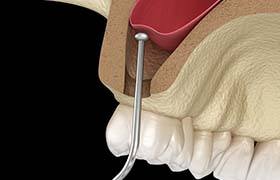
Have you ever had temporary sensitivity in your upper teeth at the same time as a cold or sinus infection? This occurs because the roots and nerves of your top teeth actually extend through your upper jaw and into your sinuses. In fact, the upper jaw is usually a bit “shorter” than the lower jaw (especially towards the back) leaving less space for the full length of both natural teeth and implants.
Just like the name implies, a sinus lift creates more space by “lifting” the sinuses. This procedure is also similar to a bone graft because it adds extra bone and height to the jaw to give an implant the support it needs to function. Patients usually need to wait several months after their sinus lift before getting implants.
As a dentist in Aurora, we’ve seen firsthand how beneficial implants are after tooth loss. When necessary, these preliminary procedures are well worth it and help you have a smile that looks and feels very natural for a lifetime.
Dental Implant Failure & Salvage

It’s true that dental implants maintain a very high success rate averaging anywhere between 95 and 98%, even a decade after they’ve been placed inside the jaw. With that said, the risk for implant failure is always there, so if you’re newly restored smile starts to feel uncomfortable or you’re worried about your dental implant for any reason, don’t wait to give our office a call. By doing so, you may be able to save your tooth replacement through dental implant salvage treatment.
Learn More About Implant Salvage
Dental Implant FAQs

Even after reading the wealth of information about dental implants on this page, you might still have some questions about the finer details of the process. Not to worry; we’ve collected some of our most frequently asked questions about dental implants and answered them here for your benefit. If your dental implant question isn’t answered on this page, just give us a call and ask!
How Is a Dental Implant Placed?
When you come to Mauck & Ricci, DDS for your dental implant treatment, the dentist has already completed a detailed plan to guide the proper placement of your new tooth. With X-rays, photos, and measurements, you can rest assured that whether you are receiving one or more implants, each one will be positioned for the greatest security in your jaw.
The procedure begins after the local anesthetic has taken affect. Then the oral surgeon makes a small incision in your gum and exposes your jawbone. The biocompatible implant is then surgically positioned in your jaw to take advantage of the greatest bone density.
What Is the Recovery Like After Dental Implant Surgery?
Most patients who have one dental implant placed are able to return to work or school after their appointment. However, if you need more than one implant, then you may need a couple of days to rest. While you recover, be sure to drink plenty of fluids, eat soft foods, and brush gently around the surgical site.
You can gradually add solid foods, but try to chew more on the other side of your mouth in order to give the tissue flap covering the implant sufficient time to heal.
How Long Does Healing Take?
The answer to that question depends on how many dental implants you’ve had placed. A single implant takes around six months, while several may require up to nine months or more.
Why Does Healing Take So Long?
A lot happens below the surface when you have a dental implant. The post and surrounding tissue integrate to form a solid foundation for your eventual tooth restoration. Called osseointegration, this process is slow, but well worth the wait. You’ll never have to worry about dentures slipping or a bridge coming loose when you have the security of dental implants.
What Is the Cost of Dental Implants in Aurora?
The average cost of a dental implant in Aurora is approximately $2,000. Of course, the number of implants you need, and the type of restoration required—a crown, a bridge, or a denture—will all affect the final cost. Dental insurance plans often cover a portion of the cost of the restoration, so be sure to check the details of your coverage.
How Long Do Dental Implants Last?
If you brush and floss your teeth well every day, then you can expect your dental implants to last a lifetime. Also, don’t forget to schedule regular dental checkups twice each year. At these appointments, we will be able to ensure the integrity of your implants and check for any signs of infection.
Dental Implants Post-Op Instructions

Once your dental implants are placed, you’ll need to turn your attention to recovery to ensure no complications arise. Thankfully, this process is relatively simple and straightforward, whether you’ve received a single implant or several. You’ll learn not only what symptoms are normal following dental implant surgery, but how to ensure the most comfortable recovery process possible. If you ever experience side effects that appear or feel abnormal, don’t hesitate to call us.
What to Do Directly After Dental Implant Surgery

One of the most important aftercare steps you should be following is protecting your healing site. Leaving the newly formed blood clot intact is critical to the healing process. To prevent it from becoming dislodged and falling off, remember to do the following:
- Get plenty of rest and avoid strenuous exercise
- Avoid spitting (use tissues to clean up excess saliva)
- Do not use drinking straws for the next several days
- Do not smoke or use tobacco products (especially on the first day after surgery)
- Avoid touching the implant site with your fingers or tongue
Common Side Effects

Mild side effects are relatively normal, particularly over the first few days after your surgery. The most common ones include the following:
- Intermittent Bleeding – Can be easily lessened by using gauze pads to apply light pressure to the treatment site. Bleeding is common for multiple days but should improve with time.
- Facial Swelling – Typically occurs over the next 72 hours after surgery. Can be managed with cold/warm compresses.
- General Discomfort – Take prescription pain medication as needed to get relief.
Diet

Sticking to a soft diet is crucial to prevent disturbing the treatment site after oral surgery. For this reason, it helps to have groceries purchased in advance so you can eat right away to keep energy up and get the nutrients you need as you heal. Common items to have in your pantry and fridge ahead of oral surgery include:
- Yogurt
- Ice cream
- Pudding
- Smoothies
- Applesauce (or other blended fruits)
- Soup (served cold or lukewarm)
- Scrambled eggs
- Soft-cooked pasta
- Soup and stews
Health & Oral Hygiene

The day after your surgery you should brush your teeth as normal. Just be extra careful when brushing around the treatment site so you do not disturb the blood clot or accidentally remove any of the stitches. Rinse your mouth out with saltwater two to three times a day (or use a prescription oral rinse if given one). Do not use any mouthwashes that contain alcohol as these can cause dry mouth.
What to Do After Your New Teeth Are Attached

Once you’ve fully healed, you can rest knowing the hardest part of your dental implant treatment is over! After your new crown, bridge, or denture is attached, you will likely notice minor gum sensitivity around your tooth replacement. This is easily managed with over-the-counter painkillers. However, if you notice bleeding, swelling, or other side effects after receiving your restoration, call us immediately.
Maintaining & Caring for Your Dental Implants

Knowing how to properly take care of your dental implants is necessary if you want to ensure their lifespan. With the right level of care and maintenance, you can enjoy a new smile that lasts for 30 years or even a lifetime! Because these permanent prosthetics can be cared for like regular teeth, it does make for an easier process; however, you must remain committed to taking proper care of your smile if you want the success rate of your implants to remain within the 90-95% range after 10 years. Contact us if you have any questions about dental implant care in Aurora.
Make Oral Hygiene a Priority
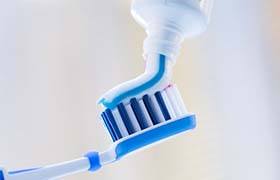
While it is impossible for your implants to develop decay and cavities, your natural teeth are still susceptible, and your soft oral tissues can be vulnerable to gum disease. By neglecting your oral health and refusing to brush, floss, and rinse regularly, you are opening your real and artificial teeth up to a host of potential problems. Should gum disease develop, you are putting your implants at risk for failure because bone and tooth loss are symptoms of advanced periodontitis. To avoid these potential problems, make sure to brush at least twice a day for two minutes, flossing between your teeth at least once a day, and rinse using an ADA-approved mouthwash.
Eat a Healthy Diet

Dental implants do allow you to eat whatever foods you like, but you’ll need to be mindful to avoid the potential for breakage or damage. Incorporating nutrient-rich foods into your diet will not only benefit your waistline, but it will also allow you to maintain a healthier smile. Hard, sticky, and sugary foods can wreak havoc on your teeth, causing decay and gum disease to form. If left untreated, you can be putting your investment at risk should your implants become loose as a result of a weakening jawbone. Instead, make sure you’re eating healthy foods and those enriched with calcium and Vitamin C, as these can help strengthen your bone and support optimal gum health.
Break Bad Habits

As a recipient of dental implants, you’ll need to make sure you break bad habits that can damage your new teeth. These can include everything from nail-biting to eating ice. Smoking, too, is not only harmful to your lungs and overall health, but it can slow down the healing process (osseointegration) and increase your risk for implant failure. Also, using your teeth to open packages and containers can leave you with breakage, fractures, and chips that require the assistance of an emergency dentist. Finally, do not chew on inanimate objects like pens and pencils, as they will wear down your tooth enamel and your customized restoration.
Protect Your Dental Implants
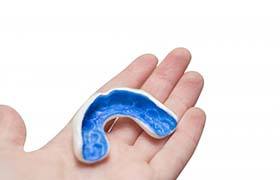
It is true that your dental implants are strong, but they’re not unbreakable. If you enjoy playing sports or are actively engaged in outdoor activities, make sure you talk to our team about getting a customized sportsguard to better protect your teeth from potential damage. If contact sports are not what you need to worry about, a nightguard can also be beneficial to protecting your new pearly whites, especially if you are prone to bruxism (teeth grinding). By having a custom-made device created for your mouth, you can ensure a more comfortable fit and minimize the potential damage that can be caused to your dental implants.
Schedule Regular Dental Checkups

Even if both rows of teeth have been replaced with dental implants in Aurora, you still need to schedule regular dental checkups and cleanings with your dentist. Here’s why: Gum disease is a real problem and without professional care along the way, you can be putting your smile at risk for failure. Dentists can easily examine your smile to ensure there are no developing problems and that your implants are in optimal condition.